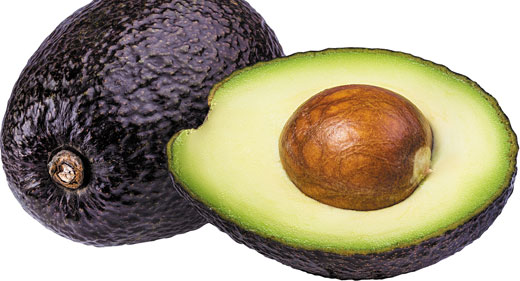Avocados are often enjoyed as guacamole.

What many of us don’t know is that this delicious fruit is also very healthy for us.
The health benefits of avocado range from helping you lose weight to protecting you from age-related diseases.
The best thing about them is that they taste good as well. This makes it easier for us to want to add them to our meals on a regular basis.
Some Nutrition Facts
You can add avocado to all sorts of dishes ranging from your salad to your smoothie. It’s rich flavor and unique texture make it something that adds character to your dish or drink.
There’s a reason that health enthusiasts add this creamy fruit to their smoothies as well.
They’re loaded with vitamins, nutrients and antioxidants.
- Each piece of avocado has immune boosting vitamin C and body building vitamin B.
- The fruit also low in carbohydrates and contains no cholesterol.
- All together avocados pack about 20 different vitamins and minerals.
- They have antioxidants that protect our bodies from harmful compounds.
- Avocados are high in fat. But, the fat in these fruits are healthy fats. They contain monounsaturated and polyunsaturated fats. Both beneficial to our health.
Health Benefits of Avocados
1. They’re One of the Most Nutrition Dense Foods Around
We’ve mentioned that avocados contain high amounts of healthy fat. Aside from that, they also have zero cholesterol. Plus, they’re low in carbohydrates and sodium.
Thanks to their high fiber content, they are filling as well.
The fruit also offers a good amount vitamins and minerals.
Here are some of the noteworthy nutrients included in one avocado fruit (around 201 grams).
- Vitamin C: 33% of our RDA
- Vitamin E: 21% of our RDA
- Folate: 41% of our RDA
- Niacin: 17% of our RDA
- Vitamin B6: 26% of our RDA
- Vitamin K: 53% of our RDA
- Magnesium: 15% of our RDA
- Copper: 19% of our RDA
2. Avocados Can Help You Lose Weight
Avocados are a high fat food. But ironically, they help with weight loss.
The reason is that they contain the good kind of fat. Majority of which is in the form of monounsaturated fats.
The oleic acid component in the MUFA, its low carb and high fiber content are what’s responsible for this. And for us, that’s a good thing.
Research by the Potchefstroom Institute of Nutrition in South Africa offers some proof. In their study, they substituted avocados in place of other dietary fats. And the results show that it was as effective in producing weight loss.
The fiber content also helps keep us full for longer periods of time.
Researchers at Loma Linda University’s Department of Nutrition put this to the test. Those who ate avocados experienced more satisfaction and less hunger after eating it. Also, it cut their desire to look for more food in the next 5 hours.
3. Avocados Contain Healthy Fats
As mentioned above, avocados aren’t like most fruits which are low in fat. Each piece of avocado comes with a total of 29 grams of fat.
Of that total, monounsaturated fats (MUFA) make up 20 grams. Polyunsaturated fats (PUFA) make up another 3.6 grams. Both are unsaturated fats. They’s the kind of fats you want to add to your diet.
Over 80% of the fat in avocados come from these good fats which help with weight loss and heart health.
Monounsaturated fats are the same fats present in olive oil. It’s also what makes that oil healthy. And extra benefit of avocados is they are low in sodium and are cholesterol free.
4. They’re Heart Healthy and Can Lower Your Cholesterol by more than 10%
It’s a given that eating fruits and vegetables can protect your heart.
Everyone knows this. But, not everyone likes trying new things. Or strange looking ones, like avocados.
One good reason to start eating them is they improve your cardiovascular health. And, come with a multiplying effect.
Avocados help lower total cholesterol. They also increase HDL cholesterol.
Eating avocados is also a natural way of reducing high blood pressure. This is thanks to their high levels of potassium.
To prove this, researchers studied a group of individuals with normal lipid levels. Then, compared them with two other groups.
The second group included participants with mildly elevated cholesterol levels. And a third group that had high triglyceride levels.
All groups received a monounsaturated fat enriched diet. They used avocados to supply the MUFA.
At the end of the study, total cholesterol levels dropped by 17%. LDL cholesterol was lower by 22%, while HDL cholesterol, the good cholesterol, went up by 11%. Finally, triglycerides also went down by 22%.
The results show that fat in avocados improve your lipid profile.
5. They Cut Your Risk of Metabolic Syndrome
People often consider avocados as one of the healthiest foods around.
By looking at the nutrients we can see why.
They are high monounsaturated fats and contain phytochemicals. Plus, they have lots of vitamins and nutrients. All this in one fruit.
But, proving what they can do can be difficult without results. This is what one study in the Nutrition Journal set out to do.
Here, researchers studied over 17,000 participants. Results showed that avocado eaters had better quality of diet overall. They were also able to get more nutrients from food.
As a bonus, the avocado group had lower body mass index (BMI). Their body weight and waistlines were also lower compared to non-avocado eaters.
These figures cut their risk of metabolic syndrome when compared to those who didn’t eat avocado.
6. One Avocado Contains Over 50% of our Daily Fiber Needs
One nutrient that most of us don’t get enough of is fiber.
Fiber helps lower cholesterol levels. It also assists in controlling blood sugar levels. And, it plays a big role if you’re trying to lose weight.
Dietary fiber is a slow digesting nutrient in food that keeps us from getting hungry quickly. It also improves your digestion and he ease constipation.
Because fiber isn’t present in all foods, a lot of us don’t get enough fiber from our daily diets.
Here’s where the avocado can help.
Each avocado fruit packs 14 grams of fiber. This gives it 56% of our daily dietary fiber needs. How great is that?
In one fruit we get more than half the fiber we need.
Getting enough fiber in your diet helps reduce the risk of colorectal cancer. This is according to research done by Harvard University’s School of Public Health.
7. Avocados Have More Potassium than Bananas
Avocados are number one in potassium. They have more potassium than other fruits or vegetables.
Even bananas as no match for this green fruit.
One avocado contains 975 milligrams of potassium. This is equal to 27% of our daily recommended dietary allowance.
Suprisingly, potassium is one of the nutrients many people don’t get enough of. In fact, less than 60% of Americans get the required 4,700 milligrams of potassium daily.
Our hearts need potassium to function properly. It needs this essential nutrient to beat.
Studies also prove that getting enough potassium helps lower blood pressure. Plus, you get to cut your risk of heart disease and getting diabetes.
If you’re an athlete it becomes an immediate priority after a strenuous workout. You’ll need to replenish this electrolytes after losing a lot of it during exercise.
Lack of potassium can cause muscle cramping. And this can take an athlete out of the game.
8. They Can Help You Live Longer
If you want to live a long and healthy, you’ll want to add avocados to your diet.
Part of living a long, disease-free life is getting rid of free radicals in the body. Here’s where avocados can help.
They are high in antioxidants, which help expel free radicals.
Avocados contain many anti-oxidants. Some of which are glutathione, carotenoids, lutein, and zeaxanthin.
Because of our eating habits and unhealthy lifestyle, people are aging faster. We’re also seeing more people get sick at a young age.
So, stop relying on the medicine cabinet. Eat healthy instead. Along with other fruits and vegetables, adding avocados to your diet helps.
9. They’re Good for Digestion
Avocados help with problems like constipation, stomach upset, and gas. Also, this green fruit can help you if you suffer from ulcers.
Vitamin K is often given to anyone diagnosed with stomach ulcers. That because this vitamin aids in the healing of these ulcers.
One way to get more vitamin K from your diet is to eat avocados. They contain 26% of the recommended daily allowance of Vitamin K.
Plus, they’re also loaded with fiber, which is a must for anyone with an extra slow digestive system.
To enjoy them, you can put them in a blender or juicer (after removing the core). You can also have them with other fruits or vegetables. Or, slice them up and add to your sandwich.
Of course, the easiest and most popular way would be to eat some chips with guacamole.
10. Avocados are Good for Your Eyes
As we get older, one of the things that often gives way is our eyes. Even if you great vision in your 20’s and 30’s, this can change when you get older.
Reading glasses sometimes become necessary. While driving at night can become more difficult as well.
Avocados have plenty of antioxidants that help prevent this from happening. Two of them, lutein and zeaxanthin, are known to improve and preserve eye health.
Lutein and Zeaxanthin are carotenoids that help protect the eyes. They also preserve good vision by filtering the harmful light from our eyes.
11. They’re Anti-Inflammatory
Aging brings harsh realities to the human body. This includes aches and pains.
The high levels of potassium in avocados offers natural pain relief. Also, vitamins C and E in avocados reduce inflammation.
This makes it helpful for anyone suffering from arthritis.
Finally, the fatty acids and other vitamins listed above help as well. They work to repair broken down cartilage in the knees, hands, hips, and back.
12. They Promote Healthier Skin
You’ve probably seen skin care products that contain avocado oils.
This is because of the vitamins and minerals found in avocados. These nutrients help soothe the skin. And they protect and repair it from damage caused by the sun and elements.
Avocados are rich in antioxidant properties. These come from the carotenoids, tocopherol, fatty acid, and fat content in them.
Together, they help protect the skin from free radicals that can damage it.
Carotenoids help keep our skin’s appearance. This includes its tone and density. Vitamins C and E also contribute towards healthier skin.
13. Avocados Can Help Your Liver Cleanse
The liver, stomach, and gall bladder are intricately connected.
Around 80% of the immune system lives in the stomach. So, when the liver is working well, you also have good immunity.
Avocados have one of nature’s most powerful antioxidants in the form of glutathione. Glutathione helps the liver filter out the toxins and other harmful substances.
This is why many people who detox use it. Increasing glutathione helps rid the body of harmful chemicals, toxins, and drugs.
Thanks to its antioxidants, avocados help increase your immunity. And, they assist the liver in cleansing the body of toxins.
Selecting and Storing Avocados
How to Choose Avocados
There are 3 things to look at when it comes of picking out avocados.
- Appearance – look for a fruit that has no blemishes or bruises. It shouldn’t have any cracks, nicks or sunken areas that may be hints of damage during picking or transport.
- Ripeness – for this use your sense of touch. When they’re ripe, they are slightly soft to the touch. It will give a bit when you gently squeeze it. but shouldn’t totally give out or be squishy, otherwise it is probably over ripe. If it is firm or very firm then it still isn’t ripe enough. You can get these but will have to wait a few days to let them ripen.
- Color – different types of avocados come in different colors. The most common ones, Hass, are greenish in color and start turning purple when then ripen. When they are in that black and purple color they are ripe enough to eat.
How to Store Avocados
- You can store uncut, unopened ripe avocado in the refrigerator. Some people choose to freeze them since these fruits actually freeze very well.
- If you’ve already sliced up the fruit, store the slices or mashed up avocado in a sealable plastic bag. A container that is air tight works as well. Don’t forget to sprinkle an acidic liquid on the avocado. You can use lemon juice or vinegar. A little sprinkle will do. Without the acid, they will oxidize and turn brown.
Preparing and Eating Avocados
To get the most nutritional value, eating avocados raw is the best way to have them. Doing so preserves all the vitamins, minerals, healthy fats. It also prevents the loss of antioxidants, which happens when you cook them.
Steps in preparing an avocado:
- Slice the fruit at the middle length-wise.
- You’ll have to go around the fruit while you cut it open because the pit is in the middle.
- The core is solid and about the size of a small golf ball, located at the center of the fruit.
- Once you’ve cut around the fruit, pull apart the two length-wise sides.
- Take out the seed.
- Get a small spoon and scoop out the flesh from the fruit.
You can enjoy the avocado straight from the spoon, or have it prepared as guacamole which is a favorite.
Other ways to enjoy it is to use it like a spread. This is like how we slather peanut butter on bread.
You can likewise slice them up and put them over salads or other dishes.
Finally, they can added to the blender when you’re creating your healthy smoothie drink.
Making Guacamole
The most popular food that’s made from fresh avocados is guacamole. You’ve probably enjoyed a few with chips or Mexican food before.
Here’s a quick and easily way to make delicious guacamole at home using avocado.
Avocado Seeds: Should You Use Them?
Most of us discard the pits of the avocado and only eat the fruit.
If you’re going after the nutritional benefits of avocados…
You might want to rethink that.
Research shows that only around 30% of the fruit’s nutrition is in the flesh. The bigger 70% chunk is in the pit, or seed.
This gives us one reason not to throw away the core. Use it instead.
Avocado seeds contain a lot of antioxidants. They are also high in soluble fiber. This is according to the Journal of Food Chemistry.
One of the antioxidants found in the seeds of avocados include flavonol. Flavonol helps strengthen your immune system and keeps free radicals away. This helps against tumor growth, aging and skin issues.
Because avocado pits offer many benefits, people are now using them in food and drinks.
How to Eat the Pits (Seeds) of the Avocado Fruit
- Slice open the avocado as you would normally do and remove the pit using the base of the knife.
- If you have a powerful blender you can pulverize the seed until it becomes fine powdered form.
- If you don’t have a powerful blender, insert the core in a small plastic bag. Then, use a hammer or meat mallet to pound it to smaller pieces.
- From there you can use a blender or food processor to grind it to finer pieces.
You can include ground avocado pit powder in smoothies or any drink, including teas. You can sprinkle it over salads and other foods like you do chia seeds.
A Word About Avocado Oil
Avocado oil comes from the avocado fruit. You can get some of the fruit’s high nutritional value by using this oil.
Here are a few facts about avocado oil.
- Avocado oil was initially developed as a cosmetic product. It contains Vitamin E and C, which is good for the skin. Along with other contents in it, avocado oil helps heal the skin. And, make it useful for better looking, healthier, smoother skin.
- One advantage of using avocado oil topically is our skin absorbs it quickly. The oil’s high skin penetration rate lets its benefits take effect better than many cosmetic products.
- You can use avocado oil for cooking. The oil is edible. And, its high monounsaturated fat and vitamin E make it a healthy cooking oil choice.
- Avocado oil has a high smoking point. Thus, you can use it in recipes where you need to cook with high heat. Using cooking oil with a low smoking point in high heat make them less healthy. This can create trans fat and free radicals start to form. Avocado oil’s high smoking point prevents this from happening.
Conclusion
Avocados are one of the most nutrient dense fruits around. They’re packed with vitamins, minerals and other nutrients.
One of the best things about this fruit is that they’re very delicious. Plus they’re easy to add to meals as well as drinks.
So, the next time you’re in the market, pick up some.









































